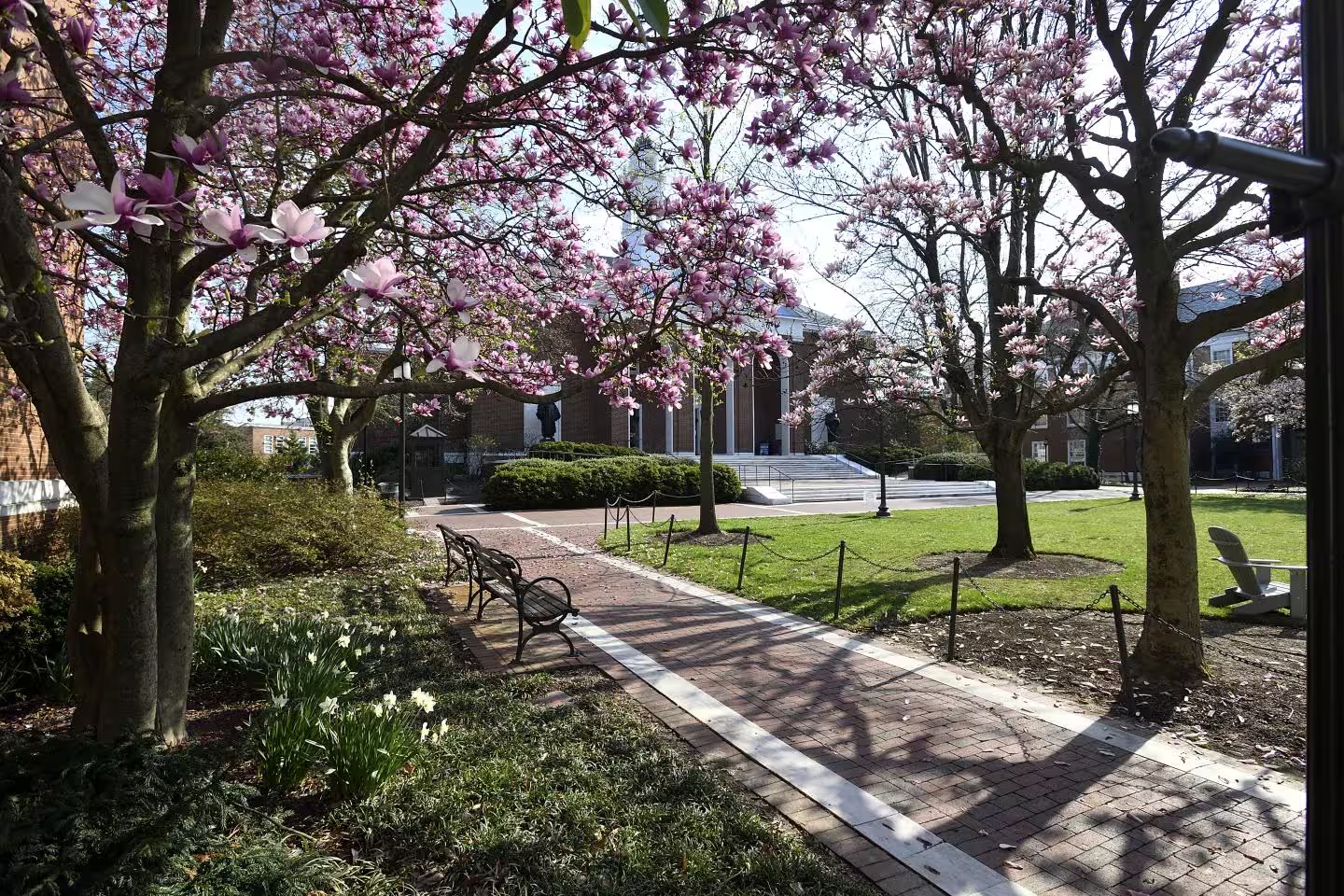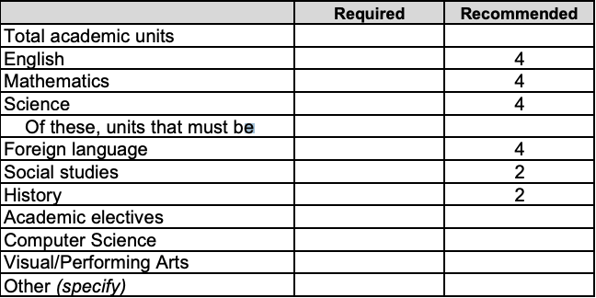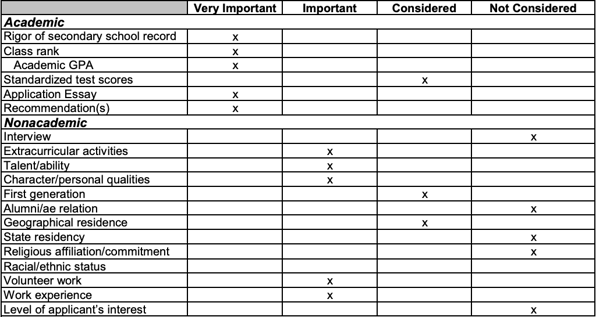Johns Hopkins University Admissions Profile

Introduction
Johns Hopkins University, renowned for its excellence in education, groundbreaking research, and commitment to innovation, stands as a symbol of intellectual curiosity and transformative learning. Students from around the world aspire to join the Johns Hopkins community and immerse themselves in a dynamic and collaborative academic environment. In this comprehensive article, we delve into the Johns Hopkins University admissions profile, shedding light on the key factors that shape the application process, the qualities Johns Hopkins seeks in its applicants, and valuable insights for prospective students. If you're ready to embark on a journey of intellectual exploration and make a lasting impact, read on to uncover the secrets behind Johns Hopkins' admissions process.
Johns Hopkins University Admissions Profile
Johns Hopkins University has a highly selective admissions process that considers various aspects of an applicant's profile. Understanding the Johns Hopkins University admissions profile is crucial for prospective students aiming to secure a place at this esteemed institution. Let's explore the essential components of the Johns Hopkins University admissions profile to gain valuable insights into the application process.
Below are tables highlighting how Johns Hopkins University evaluates each applicant through information published in the Common Data Set, a resource that compiles a standardized list of data items provided by universities about their admissions profiles.
Distribution of high school units required and/or recommended

Relative importance of each of the following academic and nonacademic factors in your first-time, first-year, degree-seeking general (not including programs with specific criteria) admissions decisions

SAT and ACT Policies


Academic Excellence: A Strong Foundation
Johns Hopkins University places significant emphasis on academic excellence. The admissions committee evaluates an applicant's high school academic record, including course selection, grades achieved, and overall GPA. Johns Hopkins seeks students who have excelled in challenging coursework, demonstrated intellectual curiosity, and shown a passion for learning. Strong performance in core subjects, particularly in areas aligned with the applicant's intended field of study, can positively impact their candidacy.
Standardized Test Scores: Demonstrating Aptitude
Standardized test scores, such as the SAT or ACT, play a role in the evaluation process at Johns Hopkins University. While the university takes a holistic approach to admissions, strong performance in standardized tests can enhance an applicant's profile. High scores in critical reading, writing, math, and relevant subject tests can demonstrate an applicant's academic abilities and potential for success at Johns Hopkins.
Research and Inquiry: Pursuing Discoveries
Johns Hopkins University values applicants who have engaged in research, independent projects, or intellectual inquiry. Participation in research endeavors, scientific investigations, or collaborations with faculty members showcases an applicant's curiosity, passion for discovery, and potential to contribute to knowledge. Research experience can significantly strengthen an applicant's candidacy.
Personal Essays: Expressing Personal Narratives
The personal essays provide applicants with an opportunity to express their unique perspectives, experiences, and aspirations. Johns Hopkins values authentic and thoughtful responses that reflect an applicant's voice, intellectual curiosity, and personal growth. Through the essays, applicants can convey their motivations, goals, and their alignment with Johns Hopkins' mission. Well-crafted essays that showcase critical thinking and effective communication can greatly enhance an applicant's candidacy.
Supplemental Essays in Johns Hopkins University's Admissions Process
Johns Hopkins University (JHU) has a reputation for fostering an environment of discovery, innovation, and collaboration. As part of its admissions process, JHU requires a supplemental essay in addition to the Common Application or Coalition Application essay. This supplemental essay is an opportunity for applicants to demonstrate their fit with the JHU community and their potential contributions to it.
For the 2023-2024 admissions cycle, the prompt for JHU's supplemental essay is as follows:
Collaboration Essay
In a 300-400 word essay, applicants are asked to discuss an experience they've had in an academic setting where collaboration led to a great outcome. JHU is particularly interested in situations where applicants have collaborated with others who have different skills, experiences, or perspectives.
This prompt is designed to assess the applicant's ability to work in a team and leverage diversity, which is central to the culture at JHU. The university values students who can bring a variety of perspectives and experiences to the table and who can work collaboratively to achieve great things.
When writing this essay, applicants should aim to showcase their ability to effectively collaborate with others, understand different perspectives, and work towards a common goal. They should highlight the skills they utilized during the collaborative process and the lessons they learned from the experience.
It's important to be specific and detailed, sharing a clear story of collaboration and its impact. Authenticity and sincerity are also crucial, as these essays provide a glimpse into the applicant's personality and values.
Keep in mind, this supplemental essay, like all components of the JHU application, is an opportunity for the admissions committee to get to know the applicant better. It's a chance to showcase attributes that aren't necessarily apparent in grades or test scores, but that are integral to being a successful student at JHU.
Sample Essays
Essay:
The white yarn slipped off my aluminium crochet hook, adding a single crochet to rows and rows of existing stitches, that looked to be in the form of a blob. Staring at the image of the little unicorn amigurumi lit up on the screen of my laptop, and looking back at the UMO (unidentified messy object) number five, I was extremely perplexed.
This had seemed so easy. Round 1, construct a magic circle with 6 single crochets. Done. Round 2 was an increase round resulting in a total of 12 stitches. Also done. The remaining rounds were blurred into hours and minutes that should have resulted in a little white creature in the likeness of a unicorn, but sitting on my desk (much like the four days before today) was a pool of tangled white yarn. It was not until day seven that a creature with a lopsided head whose horn was the only identifier of the mythical being emerged.
Very much like learning how to crochet, my journey in forging my own path and finding a passion was confusing, messy and at times infuriating. Even in primary school, I had heard all the stories of individuals finding their own route in life. I had been told stories of those who found their passion at a young age and were exceptionally proficient at their craft, of those that abandoned their interests and pursued a lucrative career, even those who chose their dreams but regretted it afterwards. This weighed heavily on me, as I was determined to have a success story as many of my other family members had. The only problem was that I did not have a direction.
In the years following primary school, I stepped out of my comfort zone in a frenzy to find a passion. I joined the school orchestra where I played the violin, and a debate class to practice public speaking and become much more eloquent. At my ballet school, I branched out to contemporary and jazz dance. I stuffed myself with experience similar to an amigurumi engorged with batting. I found myself enjoying all of those activities but soon enough, I was swamped with extracurriculars. Just like the tangles of white yarn on my desk, I was pulled in all directions. I still felt lost. To make things worse, it seemed as if everyone else had found their path in life, and they had all become white unicorns while I was still doubting the stitch I just made.
It was not until high school that I realised that I could view this mission to find a passion from another perspective. While successfully completing a crochet project is an accomplishment itself, the motions of making slip knots, single or double crochets takes you on an adventure as well. The knots that I had encountered in my craft were evidence of my experiences and what shaped me as an individual. My exploration of various paths through detours may have sometimes resulted in roadblocks, but I continued to persevere and learn from my experiences, applying the skills that I have gained to future knots. The mini adventures that I went on were all crucial to me in the greater journey of life.
Through trial and error, the current adventure that I am on resonates the most with me, taking me down the path of service and environmental activism. However, I have learnt that no one path is static, and I can be on more than one path at a time. While I may only be halfway to the proportionate unicorn amigurumi that some others may have already achieved, I still have so much to learn and so much that I want to learn, and so my journey to grow continues.
Essay:
If you told me I would be playing a sport called squash at 11 years old, I would call you crazy. But in seventh grade, I was at a new school 10 times bigger than my last one. I felt like a little fish in a big pond. I was quiet, withdrawn, and very introverted. A lot of the time, I stayed where I was comfortable.
During the first week of school, a group of people visited the school and they introduced themselves as Squashbusters. At that time, I’d only heard of Squash once before, but I didn’t really know what it was. Because the program combined the sport of squash with academic support, mentoring, and service opportunities, I decided to sign up. It’s been six years and this program has made a monumental difference in my life.
Being a part of SquashBusters is a program that really pushed me out of my shell to the point where I’ve grown accustomed to challenging myself. In SquashBusters, they tell us to push ourselves past our limits on the squash courts, but that mindset has transferred to other areas of my life as well. From team trips and tournaments to cringy karaoke moments and participating in eccentric traditions like our annual SquashBusters Olympics, my comfort zone has steadily grown larger. My peers brought out a side of me I didn’t even know existed. I haven’t transformed completely from introvert to extrovert, but I’ve become more social as the years go by.
At Hopkins, I want to do something similar. I want to try new things and embrace the campus traditions. Even though I will develop intellectually from the many academic classes and clubs/activities offered on campus, I feel as though a true community is birthed from exploring beyond what one’s used to. From traditions like Blue Jay Opening Day and the Spring Fair to the many world-changing clubs like the Amnesty International club and the Foreign Affairs Symposium, the different ways to be involved in the Hopkins community is limitless and invigorating and I can’t wait to be a part of the Hopkins family.
Letters of Recommendation: Insights from Others
Letters of recommendation offer valuable insights into an applicant's character, abilities, and potential for success. Johns Hopkins typically requires two letters of recommendation, often from teachers or mentors who can speak to an applicant's academic achievements, personal qualities, and potential contributions to the university community. Selecting recommenders who know the applicant well and can provide specific examples of their strengths is crucial.
Demonstrated Impact: Making a Difference
Johns Hopkins values applicants who have made a positive impact in their communities and beyond. Engaging in extracurricular activities, community service, leadership roles, or initiatives that address societal challenges showcases an applicant's commitment to making a difference. Johns Hopkins seeks individuals who demonstrate leadership, resilience, and a desire to contribute to the betterment of society.
Johns Hopkins University Application Deadlines
Johns Hopkins University (JHU) offers several application plans to its prospective students: Early Decision I (EDI), Early Decision II (EDII), and Regular Decision (RD). Each plan has its own distinct set of deadlines, which allows applicants to choose the one that best aligns with their application strategy and timeline.
Early Decision I
JHU's EDI is a binding agreement - if accepted, students commit to attending JHU. The EDI application deadline is November 2, with admission decisions typically released by mid-December. This is a great choice for students who have identified JHU as their top-choice institution.
Early Decision II
Like EDI, EDII is also binding, but the deadline is later - January 4. This gives students who decide later in the application process that JHU is their first choice an opportunity to demonstrate that commitment. Admission decisions for EDII are usually released by mid-February.
Regular Decision
The Regular Decision deadline is January 4, providing applicants with additional time to finalize their applications. Decisions are typically released by the end of March, and students have until the universally acknowledged "Decision Day," May 1, to accept their offers.
Financial Aid Application
For financial aid consideration, JHU requires the submission of the CSS Profile and the FAFSA. The deadline for these documents aligns with the respective application plans: November 15 for Early Decision I, January 15 for Early Decision II, and March 1 for Regular Decision.
All application components, including the Common Application or Coalition Application and the JHU supplemental essay, must be submitted by 11:59 PM Eastern Standard Time (EST) on the respective deadlines.
Understanding these deadlines is a crucial part of the application process. Students should ensure they allow themselves enough time to complete and review their applications, aiming to present a compelling picture of their experiences, abilities, and fit with JHU.

Frequently Asked Questions
What is the acceptance rate at Johns Hopkins?
The acceptance rate at Johns Hopkins University is typically around 10-11%, making it a highly competitive institution.
Does JHU require interviews for all applicants?
Does JHU consider demonstrated interest in admissions decisions?
Johns Hopkins University takes a holistic approach to admissions and does not formally track demonstrated interest. Admissions decisions are primarily based on an applicant's qualifications, achievements, and fit with the university's academic community.
Conclusion
Securing admission to Johns Hopkins University requires a combination of academic excellence, intellectual curiosity, and a commitment to making a positive impact. By understanding the various components of the Johns Hopkins University admissions profile and showcasing your unique strengths, you can increase your chances of joining the esteemed Johns Hopkins community. So, embrace intellectual exploration, pursue your passions, and let your desire to make a difference guide you toward unlocking the doors to academic and personal success at Johns Hopkins University.
